Aberystwyth University Visibility Awards
To celebrate International Women’s Day we invite you to nominate women and non-binary members of staff and recognise their contribution to research in Aberystwyth University. We encourage you to look beyond those who are traditionally celebrated and be part of disrupting the dominant representation of success.
In a thriving research environment, certain contributions may go unseen, from ECR or mid-career academics whose research is under-acknowledged, to technicians, librarians, administrators and many others. We welcome nominations that consider the intersections between identity categories, such as gender AND race, ethnicity, religion, age, sexuality, class, parental status, those with disabilities or any other relevant identities. All nominees who meet the criteria will be recognised by the Visibility Awards. These awards are about visibility and representation. Awardees will be displayed across the university for students and staff to see. This will include an exhibition in the Iris de Freitas room of the library.
To nominate, send 1 A4 page (100-200 words, ariel, font 12) with: (1) The name, role and department of the nominee and the nominator; (2) a description of their work and why it deserves to be seen. Note: This paragraph will be made public; (3) how this person meets the criteria of rethinking who is visible in research; (4) The nominee’s preferred photograph (or an image chosen by them); (5) Confirmation that the nominee has consented. You can nominate up to three people. Past award winners can be nominated by other nominees or may wish to nominate someone themselves. Submit nominations by 14th February (Valentine's Day) to: caw113@aber.ac.uk
2025 Award Winners
Alice Earp
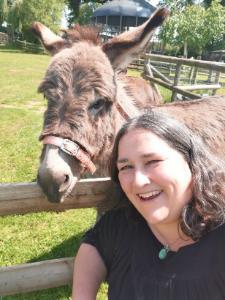
Campaigns & Publications Officer
Communications and Public Affairs
Alice Earp is Communications Officer in the Communications and Public Affairs Department of the University. She is responsible for the Faculty of Arts and Social Sciences and helps us all to communicate our news, events and research to the wider public and the media.
Alice is knowledgeable and very approachable and very good at encouraging all colleagues to think about how their research can be communicated outside AU. I feel this is very important as there is so much fantastic research at AU. Research in the Arts, Humanities and Social Sciences can sometimes be overlooked, and Alice helps to make it visible.
Anna Evans

Faculty Officer
Academic Registry
Anna is a member of the Faculty Operations Team in the Faculty of Earth and Life Sciences, wherein she has responsibilities for supporting research primarily within the Department of Life Sciences. Anna also handles much of the logistics surrounding placements connected to the nursing degree programme.
In the context of the above roles, Anna’s contribution to supporting the research and teaching activities of DLS, and FELS more generally, is significant. This includes facilitating projects through processing equipment purchases and travel bookings, contributing to meeting and conference preparations, and assisting in practical aspects of fieldwork and fieldtrip planning. In so doing staff depend on Anna to fulfil these roles and, crucially, provide guidance and advice. This includes connecting people with colleagues in professional services, where Anna’s knowledge of university structures and processes is invaluable. This is particularly so in the case of Early Career Researchers, first-time grant holders and PhD students, where her experience and can-do attitude (coupled with no small amount of fun and good humour) is very much appreciated.
Charlotte James
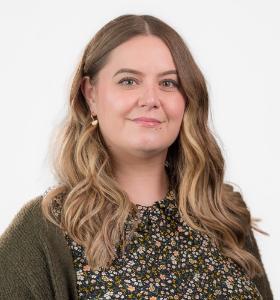
Contracts Officer
Research, Business & Innovation
Charlotte has been directly supporting research and researchers in her current role as a Contracts Officer since December 2021. She is responsible for providing a professional service, drafting, negotiating and reviewing research-related contracts across the University. She works closely with researchers and supports them through a complicated and often stressful process with diligence, care and understanding.
Her role is extremely busy, fast-paced and demanding with very tight deadlines. She works extremely hard to ensure that she meets deadlines for researchers and undertakes this difficult role with professionalism and kindness, offering researchers a lot of communication and support whilst they try to navigate this process.
Charlotte provides an enormous contribution towards research and for researchers, and work like this often goes unnoticed when we discuss research support. She is an extremely valued member of staff and a key part of the research process whose contribution deserves recognition.
Donia Richards and Glesni Davies
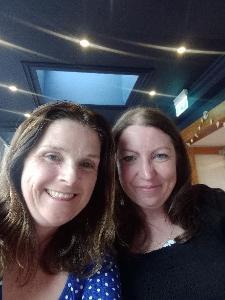
Academic Registry Officers
Faculty of Arts and Social Sciences
As Academic Registry Officers, Donia and Glesni undertake extensive and essential work to support the departments of International Politics and History & Welsh History, thus enabling our vibrant and diverse research communities. By supporting students and staff in managing student registration, overseeing course administration, and ensuring compliance with academic policies, Donia and Glesni ensure that colleagues in both departments have the necessary space to pursue their research. Their efficient work and knowledgeable support in these areas (and more!) is vital to achieving the research agendas and ambitions of undergraduate, Masters and PhD students, as well as faculty.
Donia and Glesni’s professionalism and dedication are equalled only by their friendly and supportive approach. As Welsh speakers, Donia and Glesni engage with students and staff in both languages, supporting our commitment to bilingual learning and research.
Dr Emma Sheppard
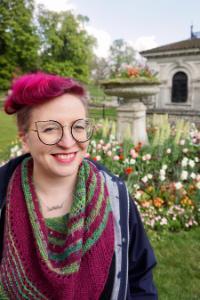
Lecturer in Sociology
Department of Geography & Earth Sciences
Emma’s research in the field of Critical Disability Studies has explored the relationship between time, crip theory and queer theory. Her book “Chronic pain, BDSM and Crip time” draws on her PhD research to challenge normative expectations of what it means to live in pain by examining embodied experiences of chronic pain and its relation to BDSM play.
Emma actively participates in research events. She has presented her research at the EDI Intersectionality Expo and in the DGES research seminars. Her current projects include Autistic Spaces of Welfare, Trauma-informed pedagogy and research, using creative methods through an asynchronous quilting circle to explore queer-crip futurity, and exploring resistance to BMI-based measurements of health. She regularly attends the Women in Research Network lunchtime sessions and is a member of her department’s EDI Committee.
Emma’s fantastically engaging teaching style has ignited her students' curiosity in research, particularly in the modules that she coordinates on ‘Gender and Sexualities’ and ‘Sociological Theories’. She has also been intrinsic to the development of Aberystwyth University becoming a trauma informed university.
Dr Fiona Corke
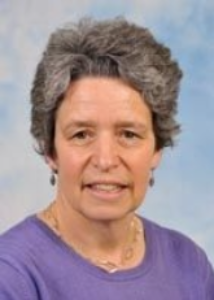
Smarthouse Manager in Plant Phenomics Centre
Institute of Biological, Environmental and Rural Sciences
Fiona is the manager of the Smarthouse at the National Plant Phenomics Centre, IBERS. In her role she oversees the day to day running of the glasshouse facilities, liaises with academic and company customers, designs the experiments, collects data and writes reports. But in addition to all of that she grows and cares for all the plants, sometimes there are hundreds of pots with exact amounts of soil to prepare in a day, she collects experimental data, scoring traits across hundreds of plants very specific timings (late nights and weekends), does all the data upload and analysis and of course all the tidying and pot washing involved.
This work goes completely unrecognised but is essential to the upkeep of such a facility. She also does dozens of tours of the Phenomics glasshouses where she speaks passionately about plant science. She shows the same enthusiasm and commitment when speaking to children of the local primary or to a Welsh Government minister. She is always available to students and spends time helping them design experiments and determine the best conditions to grow their plants. No new plant species or growth demands are ever too much. And all of this with a smile on her face. She is the driving force behind one of the unique facilities we have at Aberystwyth University.
Dr Jenny Mathers
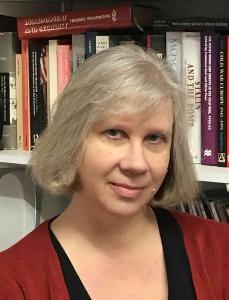
Senior Lecturer in International Politics
Department of International Politics
Jenny Mathers is an expert on Russian politics and security, and women and war. Since the start of Russia’s mass invasion of Ukraine in 2022, she has frequently been asked to share insights from her research with wider audiences. She has given more than 450 media interviews about the war, appearing on the BBC News Channel, the World Service, Radio 4, Radio5Live, BBC Radio Wales, the Canadian Broadcasting Corporation, US National Public Radio and the Australian Broadcasting Corporation among others.
She regularly writes for The Conversation and has been quoted in The Washington Post, The Wall Street Journal and The New York Times. She has advised the Foreign and Commonwealth Office and the Cabinet Office, while her expertise on the Russian armed forces was sought by the United Nations’ Independent Commission of Inquiry into the war in Ukraine. She has also been invited to share her research on gender and the war with the Portuguese Ministry of Defence. Closer to home, she addressed the University Court (May 2022) about the war in Ukraine and chaired the disinformation event hosted by Aberystwyth University (October 2024), part of the series “Unfolding Our Shared Future”, with speakers from BBC Verify and The Washington Post.
Dr Katy Budge

Lecturer in International Relations
Department of International Politics
Katy joined the Department of International Politics in August 2023, and has taken on a large teaching role which makes continuing with research extremely challenging. This hasn’t stopped Katy from bringing incredible energy and enthusiasm to our research community. She has worked tirelessly to highlight diversity and inclusivity in research. For example, she has used innovative creative methods to engage and develop new collaborations with refugee communities in Aberystwyth. This has led to exciting new research agendas which are co-produced with individuals and communities that are rarely involved in academic research.
Through her leadership of the department’s Diversity Working Group, Katy has also worked collaboratively to ensure issues of diversity and inclusivity are central to research activities (such as our weekly seminar series) in the department. She was also instrumental in producing the ‘Black Thinkers’ posters across campus during Black History Month, and which celebrated the under-valued intellectual contributions of black scholars. Katy has gone far beyond what is expected of her in her current teaching role. Her inspirational contribution to research in our department deserves to be recognised and celebrated.
Dr Praboda Rajapaksha
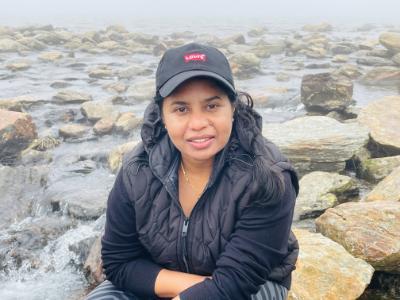
Lecturer in Health Data Science
Department of Computer Science
Praboda’s research focuses on artificial intelligence (AI), machine learning and data analysis, with a strong emphasis on their applications in health data science and various other fields. She is also actively involved in Natural Language Processing research, utilising large language models. She holds a unique position in our department; her lecturer role is partially funded by the Hywel Dda University Health Board, where she is acknowledged as a Data Scientist.
Additionally, she serves as an Adjunct Professor at the Institut Polytechnique de Paris in France. Her latest research focuses on developing a patient digital twin technology, also known as virtual patient. It encapsulates an individual’s health and medical history, providing a continually updated digital representation of a patient. This enables healthcare professionals to predict, prevent, and treat diseases more effectively and efficiently through decisions generated with AI.
Dr Susan Chapman
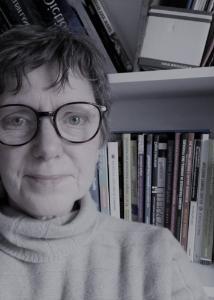
Lecturer in Education
School of Education
Although Susan has not exclusively been on a T&R contract, she has consistently contributed to, developed and undertaken a variety of research projects. She has contributed to a wide variety of publications which has aided in developing the department's research profile and culture. She is also extremely supportive of all staff members and is an effective sounding board for new ideas.
Susan often downplays her contribution, and this is an opportunity to recognise and thank Susan for all her ongoing work and support.
Dr Tracy Richmond Knight

Post Doctoral Research Assistant
Department of Life Sciences
Tracy completed her PhD in 2024 researching prostate cancer which identified several key biomarkers in urine that provide much greater diagnostic accuracy than the PSA blood test currently used by the NHS. Tracy was heavily involved in developing a groundbreaking urine-based test that can quickly and accurately detect prostate cancer. She will now apply this research to test the effectiveness of Lateral Flow devices detecting early indications of lung cancer.
One in eight men will be diagnosed with prostate cancer in their lifetime. Each year, more than 12,000 men lose that battle. Traditionally, a barrier to men being diagnosed and treated for this type of cancer has been their perceived embarrassment around the testing they might need to undergo. In developing a test that’s as familiar and easy as a lateral flow test, Tracy’s research will be removing that barrier. Early detection saves lives and Tracy’s research has the potential to save thousands.
Dr Yvonne Ehrstein
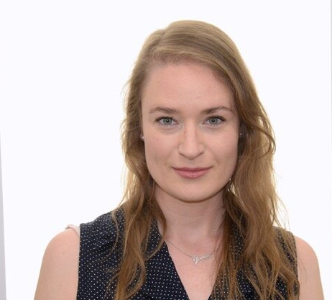
Lecturer in Sociology
Department of Geography & Earth Sciences
Yvonne is a feminist sociologist whose research interests lie in gender with a focus on discourses of equality, work and care in off- and online spaces. She is a co-convenor of Aber Gender, the Interdisciplinary Gender Studies Research Group that she helped to re-launch in 2024. Additionally, she is an active member of the organising committee of the Women in Research Network.
The Visibility Awards were the brainchild of Yvonne and Amy Sanders collaborating to advance equality while challenging the dominant representations of academic success. Thus, although Yvonne only joined Aberystwyth University in 2023, she has made a sizable contribution to the University’s research culture particularly in driving forward gender equality.
Elizabeth Rowlands

Research Development Support Officer
Research, Business & Innovation
Elizabeth has provided an enormous contribution towards supporting researchers and the research process since she started working for the University in 2012. As the Stores Administrator in IBERS, Elizabeth was responsible for the daily running operations of IBERS stores and fulfilled a wide range of administrative tasks, processing of all IBERS invoices, maintenance of records relating to all incoming deliveries, ordering of goods including research consumables, chemicals, solvents, and perishables.
Elizabeth was the lead for organising the preparation, shipment, and receiving of - Biological Substance Category B research samples including plant, animal and human samples, on dry Ice. She would advise research staff and students throughout the whole process to make sure their highly valuable research samples were delivered safely and on time. These samples have contributed and played a vital role to many research projects within Aberystwyth University.
As part of her current role as Project Officer for the Research Development team, she works with researchers on research proposals, funding applications, and awards and is a key part of the team that has led the implementation and management of the Worktribe system. She also supports researchers and processes proposals on the University's CRM system and on ABW.
Helena Norris
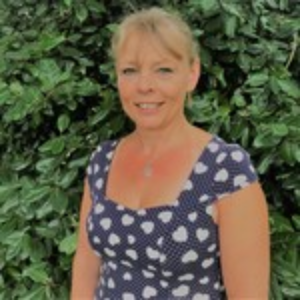
Research Finance Officer RWIF
Research, Business & Innovation
Helena Norris works in the Research Finance Office. Without the assistance of the Research Finance Office many at AU would find it very hard to carry out our research projects and manage our research funding. Helena is a new member of staff who has made a big impact on my work and the work of many colleagues I have spoken to.
Helena is able to liaise between academic and research finance; she is able to explain what is needed which I feel is very important, especially as not all funding is from the more well-known UKRI sources. She understands what researchers need and this has made the research finance process so much better. I feel this should be highlighted and I therefore nominate her for a visibility award.
Lora Gibson
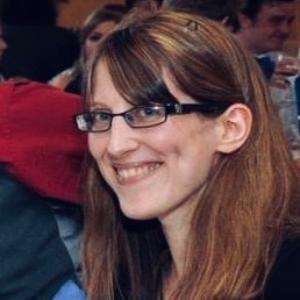
Research Impact and Knowledge Officer
Research, Business & Innovation
Lora Gibson works as Research Impact Officer in the Department of Research, Business and Innovation. She fulfils a very important role in the research process supporting academics to explore and extend the ways our research can have a real-life impact, and how we can evidence this impact in the REF process.
Lora understands the research process from an academic and from a Research Office point of view, and is able to connect both aspects. Lora is always helpful and supportive, and willing to work with us to improve our reports and applications. She is a fluent Welsh speaker and is willing to help all of us to reach our projects impact potential.
Professor Mariecia Fraser
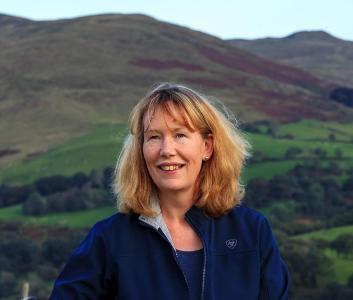
Professor in Upland Agroecosystems
Institute of Biological, Environmental and Rural Sciences
Mariecia heads up Pwllpeiran Upland Research Centre, which is the only remaining upland research centre in England and Wales. She leads a diverse programme of multidisciplinary research work, with numerous national and international partners. Her research focuses on grazing ecology, specialising in developing and testing management strategies for upland agroecosystems that deliver agricultural production while improving biodiversity. Her interests include species and breed differences in diet selection and behaviour, conservation grazing, nutrient supply from forages, greenhouse gas emissions from livestock, and the bio-energy and carbon sequestration potential of semi-natural grasslands.
She has developed projects with colleagues in Geography, Computer Science, Art, English, and International Politics, among others, promoting the upland landscape in a truly multidisciplinary way. She teaches on courses in Sustainable Land Management and Veterinary Science and has supervised numerous postgraduate students over the years. She also contributes significantly to government policy change through her work with agencies such as Natural England.
Rebecca Zerk
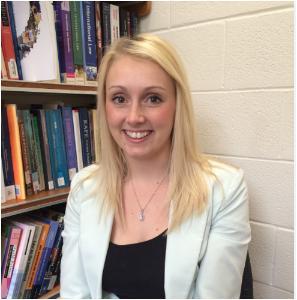
Co-lead Dewis Choice
Department of Law & Criminology
For over a decade, Rebecca has been a pioneering force in research with older victim-survivors of domestic abuse, ensuring that their voices—so often unheard—are placed at the heart of policy and practice. Her commitment to driving forward equitable responses for older people has had a transformative impact, shaping both awareness and positive practices. Rebecca is dedicated to co-production, engaging directly with older people to ensure their lived experiences inform real change. By embedding their voices in every stage of her research, she has not only influenced policy but has also empowered older individuals.
Beyond academia, Rebecca has developed a range of multi-media resources, including films, podcasts, animations, and practitioner guidance, which have played a pivotal role in improving responses to older victim-survivors, in Wales and beyond. In addition to her research and advocacy, Rebecca is a supportive colleague and mentor, offering invaluable guidance to both the Dewis Choice team and the wider Aberystwyth University community. Her generosity in fostering the development of others underscores her commitment to creating a lasting and collaborative legacy in this field.
Tally Roberts
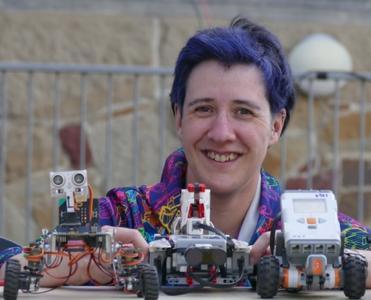
Associate Lecturer Science Outreach
Department of Computer Science
For over a decade, Rebecca has been a pioneering force in research with older victim-survivors of domestic abuse, ensuring that their voices—so often unheard—are placed at the heart of policy and practice. Her commitment to driving forward equitable responses for older people has had a transformative impact, shaping both awareness and positive practices. Rebecca is dedicated to co-production, engaging directly with older people to ensure their lived experiences inform real change. By embedding their voices in every stage of her research, she has not only influenced policy but has also empowered older individuals.
Beyond academia, Rebecca has developed a range of multi-media resources, including films, podcasts, animations, and practitioner guidance, which have played a pivotal role in improving responses to older victim-survivors, in Wales and beyond. In addition to her research and advocacy, Rebecca is a supportive colleague and mentor, offering invaluable guidance to both the Dewis Choice team and the wider Aberystwyth University community. Her generosity in fostering the development of others underscores her commitment to creating a lasting and collaborative legacy in this field.
2024 Award Winners

Dr Amanda Clare

Senior Lecturer
Department of Computer Science
Amanda’s research is in the area of bioinformatics and data science. She coordinates the department’s Bioinformatics and Health Informatics research group and has built a lasting interdisciplinary bridge in form of a regular joint bioinformatics research seminar with IBERS. Amanda easily finds connections to different areas of research, having published in the area of string algorithms and working on robust statistics for advanced control of water treatment with Dŵr Cymru.
Computer Science research is frequently most impactful when it joins another discipline and contributes to an outcome that often lies outside pure Computer Science. This can make it difficult to celebrate and appreciate the Computer Science aspects of the work. This is particularly true for Amanda’s work that contains very significant contributions to the field of molecular biology and genomics. I would like to see a much more public acknowledgement of her role and the contributions she makes.
Dr Amanda Lloyd

Researcher: Food, Diet and Health
Programme Manager: SODIAT Programme Grant
Department of Life Sciences
Mandy’s research is centred around development of metabolomics technology to investigate the detailed composition of food products and to track diet-derived metabolites in bio-fluids after food consumption. Mandy has raised myself and my colleagues up, giving us additional opportunities above what might be expected, to nurture keen researchers in a lower position than herself. She is incredibly supportive and has the most enthusiastic and can-do attitude towards research and her employees
We have never heard Mandy say no to an opportunity. If a younger and less qualified member of staff approached Mandy with an idea, she never turns it down, simply works with the individual to get it off the ground, going far beyond other researchers. Mandy is always keen to give opportunities and work with people who do not necessarily have the typical science background, as well as people who need additional help within the workplace.
She builds those around her up, she is a mentor, underappreciated and a female role model to women and all within our research group. We wholeheartedly would love to see Mandy appreciated for not just her innovative research, but her mentorship in building people up around her, regardless of who they are.
Dr Amanda Lloyd (second nomination)

Researcher: Food, Diet and Health
Programme Manager: SODIAT Programme Grant
Department of Life Sciences
Mandy has expended a huge effort in developing relationships with Welsh companies in her role with the Diet and Health Research team and has played a key role in managing the £3.5 million WEFO Future Foods project. Over the past two years Mandy has become embedded in 4 of the 6 BBSRC Nutrition Research Hubs, regularly interacting with UK companies and introducing them to the research skills present in DLS, IBERS and AberInnovation. This effort has culminated in helping companies to develop four successful Innovate UK grant applications and the development of many new products. Mandy brings energy, drive and passion to her role and has been responsible for significant research income and product development in a critically important sector of the Welsh economy.
This type of translational activity often receives less publicity than fundamental research, but it is critically important in terms of its contribution to both the Department’s and the University’s mission to impact positively on regional and national economies. By building meaningful knowledge-transfer partnerships and research relationships with commercial food and drink companies based in Wales and beyond, Mandy is in many ways spearheading the Department’s drive towards diversifying funding income streams and ensuring translation of our research into tangible outcomes for society.
Amy Nicholass

Dr Amy Sanders

Post-Doctoral Research Associate - WISERD
Department of Geography and Earth Sciences
Amy has been an outstanding colleague on the WISERD Civil Stratification and Civic Repair research centre. She has been invaluable over the last year with running two one-day public engagement events around communication research on civil society and polarisation. Amy oversaw the programme and designed inclusive and sensitive activities that allowed difficult topics to be discussed in detail. Amy also ensured that appropriate resources for activities (central to counter-polarisation events) were available, and that a range of civil society organisations could attend. She also steered discussion and participation in a highly effective way. Beyond her work for WISERD, Amy has been a valuable member of several networks at AU and beyond, including AU’s Women in Research Network, the Voluntary Sector Study Network (trustee), and the LSW’s ECR network. Amy is also a very enthusiastic and encouraging colleague.
RAs, with the precarity that comes with the position, are often overlooked or ineligible for recognition. However, their work is essential to research projects’ successes. Public engagement work is also the submarine part of the proverbial impact iceberg, laying the foundation for the transformative potential. Recognising Amy’s efforts would give visibility to the skilful organisation and conduct of such events.
Dr Ana Winters
Principal Investigator
Institute of Biological, Environmental and Rural Sciences
Ana is always wiling lend an ear or a hand no matter the subject. She always provides positivity, insight and perspective. She has supervised tens of students and written many grants, overseen numerous projects; yet is always supportive of others.
She is an amazing role model both as a researcher who has successfully combined being a scientist and parent; and an exemplar of a successful scientist with a significant publication and grant-writing record who is frequently working under the radar to support colleagues and students.
Cara Rainbow

Administrator
Department of Geography and Earth Sciences
Cara is the administrator for the Wales Institute of Social and Economic Research and Data in WISERD as well as the Centre for Welsh Politics and Society (CWPS), among other roles.
Cara was one of the inspirations for these awards. The degree of support she gives to research projects is incredible. From the exceptional way that she coordinated the conference on polarisation to the fantastic support she provides in ensuring that research impact activities are promoted and achieve their goals, she carries out this work with a fantastic level of professionalism and an eye for detail.
All too often the focus is on the academic who undertakes the research and not enough credit is given to women like Cara Rainbow that enable high quality research. She is a real asset to our team.
Dr Catherine Howarth
Reader
Institute of Biological, Environmental and Rural Sciences
Catherine has contributed many years to the institute, both as IGER and IBERS.
She leads the research underpinning our commercial breeding of oats, peas and beans as well as extensive collaborative research, including via Horizon 2020 funding, through the post-Brexit years.
Catherine works collaboratively with international academic colleagues and industry. She has a strong record of grant capture and publications.
Dr Catrin Wyn Edwards

Welsh Medium Lecturer in International Politics
Department of International Politics
I nominate Catrin for her supportive, collegial, and encouraging approach to research. In 2017 Catrin coordinated an event to bring together migration researchers at Aberystwyth, allowing connections to be made and opportunities for collaboration to be developed. Several seminars from ECRs were held over the next two years, before this informal network was superseded by CMOP. In 2021, Catrin co-founded WISERD’s Migration Research Wales network, aimed at connecting researchers, practitioners and policy makers, and capacity-building among emerging researchers. Since its launch, the network has held several events, and an edited volume commissioned by the UWP has emerged from one of these, showcasing contemporary migration research in Wales by ECRs. During the Covid-19 pandemic, Catrin also supported colleagues through an online writing session, which enabled some ‘drop-in’ time to work on research. This allowed colleagues access to valuable research time for colleagues in a supportive environment.
The ’quiet collegiality’ Catrin offers often goes unnoticed. It is the support, encouragement, and the opportunities found and shared that lead to outcomes and success, but this labour is usually unacknowledged. Care-full labour is under-acknowledged in teaching, while it is seldom mentioned in research settings. Recognising Catrin’s efforts in supporting colleagues during Covid and promoting ECRs gives recognition.
Dr Christine Zarges
Senior Lecturer
Department of Computer Science
Christine’s research is in the area of artificial intelligence, concentrating on heuristic optimisation. She has made significant contributions to the theory of artificial immune systems and evolutionary algorithms, providing a firm foundation for their successful application. She has significantly increased our university’s visibility in her field of research by representing the UK in two COST actions and bringing a leading European conference to Aberystwyth in April, EvoStar 2024.
Her contributions to the foundations of artificial intelligence are providing the indispensable, firm foundations on which others build more eye-catching applied research.
Dr Debbie Nash

Senior Lecturer
Department of Life Sciences
Debbie has worked enormously hard to successfully create a research niche that has brought AU into collaborative relationships with several overseas partners with shared equine and veterinary interests. Debbie has pioneered a technique of studying reproductive physiology in mammals without the need to harvest tissues from living animals and in so doing has contributed to the development of animal welfare and ethical research. Her partnerships have the potential also to extend into the development of reciprocal teaching activities. Debbie has mentored other successful women at AU and continues to push herself in the research arena, whilst delivering a significant teaching load and leading on student international exchanges for the Department.
Debbie is an example to others with her quiet determination to succeed in a highly competitive discipline – the development of ex vivo tissue culture models for reproductive research – where she operates in a traditionally male-dominated world. Through her international research projects – most notably in the UAE – Debbie works together with other DLS female academic colleagues and champions the role of women in science and the values of the University and Department.
Elain Donnelly

Facilities Porter
Estates
I’m sure we’ve all been there, where two arms aren’t enough to get our work done. Luckily, Elain is always there to lend a helping hand and has helped me move event equipment several times. She is someone I can rely on to help me get the job done even when it is short notice.
I don’t think we could achieve as much as we do, daily, without the help of Elain. When you organise events (or anything) for the university, everything needs to run on time, so it’s important to know you’ve got someone like Elain who you can rely on, it’s a bonus that she has a can-do attitude. She makes sure I can do my job, which in turn, helps the researchers and academics do their jobs.
Elaine Lowe

Faculty Officer
Faculty of Earth and Life Sciences
Elaine Lowe is a member of the Faculty Operations Team in the Faculty of Earth and Life Sciences. As part of her Faculty duties, she is responsible for supporting research in the Department of Geography and Earth Sciences.
Elaine’s contribution to research extends to supporting FELS Research Committee and she worked hard to support the University-wide Research Implementation Planning Group during the Covid-19 pandemic. Elaine supports the research of DGES staff and research students in a variety of ways. This includes helping Principal Investigators with recruitment of project teams, providing induction and advice to project staff, support for equipment purchases, arrangements for conferences and workshops, and assisting staff with travel bookings for fieldwork, conferences or meetings.
Elaine makes research happen by providing efficient support to our research community and effective liaison with professional services colleagues. She knows the university systems inside out, who to ask for help and will always go the extra mile to support colleagues, often when timescales are tight. Elaine makes an integral and much-valued contribution to research activities across DGES.
We are very grateful for all that she does.
Dr Elena Spagnuol

Associate Lecturer
Department of English & Creative Writing
Elena Spagnuolo works as an Italian language instructor, Associate Lecturer in the School of Languages and Literature, and Fellow at the Centre for the Movement of People (CMOP).
Despite not being on a research contract, Elena was awarded a British Academy Small Grant in 2022 to support her research into the so-called Happiness Trains, a children’s evacuation scheme between Southern and Northern Italy.
She has recently published her first monograph, Voices of Women Writers: Using Language to Negotiate Identity in Transmigratory Contexts, which investigates the practices of writing and self-translating within the context of mobility.
Professor Andrea Hammel has nominated Elena because of her dedication and ambition to develop her own research projects despite the precarity of her contracts and the need to work part-time for different University units. Andrea especially appreciates Elena’s ability to be open to innovation and work with others to drive the Aberystwyth University Research Agenda forward.
Elin Williams

Translator
Centre for Welsh Language Services
Elin has translated many things for me. She's very thoughtful regarding using the right words and terms and in understanding our work, and is very quick when possible. I appreciate her professionalism and friendly communication. She has made it possible to launch these awards.
In a thriving research environment in Wales, it is very important to use the Welsh language with everything we do. All too often a translator's work goes unnoticed. But translation services are at the roots of Welsh research.
Dr Elizabeth Gagen

Senior Lecturer in Human Geography
Department of Geography and Earth Sciences
I am nominating Dr. Liz Gagen because I believe her contributions to the research culture within the Department of Geography and Earth Sciences, and indeed the University and wider discipline, have been significant but under appreciated. Dr. Gagen has been central to agenda setting developments in the interconnected fields of psychology, childhood studies, mental health and geography. Her research and writing are characterised by empirical rigour and theoretical nuance. She has been central to our understanding of the historical connections between psychological apprehensions of the world and constructions of childhood and mental health. As someone who works in an allied field to Dr. Gagen, I have been influenced by the intellectual insights of her work and inspired by her approach to research and thinking. I have, however, been consistently surprised by the fact that her work is not celebrated more widely, and her influence is not acknowledged more clearly. In her recent work documenting the history of the Cefn Coed mental hospital in Swansea, Dr. Gagen has developed innovative approaches to public engagement and research impact. At the same time her work at Aberystwyth University has pioneered radical new understandings of the role of ethics and inclusion within research practice. Given the excellence of Dr. Gagen’s research and her wider contribution to our collective research culture, I firmly believe that she is precisely the sort of person we should be recognising as part of the University’s Visibility Awards 2024.
Elize Freeman

Dewis Choice Wellbeing Practitioner and Service Development Lead
Department of Law & Criminology
Elize contributions transcend traditional boundaries of academia, significantly impacting local and national strategy, policy and service development in Wales and England.
Elize’s dedication to amplifying the voices of older victims, often overlooked in strategic discussions, is commendable. Elize challenges conventional notions of visibility in research, advocating for inclusivity and equity. Her passion for empowering hidden voices not only reshapes the discourse but also encourages collaboration among diverse stakeholders, inviting critical reflection and driving meaningful change.
By honouring Elize, we celebrate not only her individual achievements but also her tireless dedication to creating a more inclusive and impactful research environment that extends beyond her remit and raises the profile of older women.
Dr Flossie Caerwynt

Post-doctoral Research Associate (WISERD Civil Society)
Department of Geography and Earth Sciences
I am nominating Flossie in respect to her outstanding efforts to build and facilitate a research community among PhD students and Early Career Researchers (ECRs) studying Welsh society across multiple disciplines. In her various roles, she has built an effective network amongst those newer members of the research community. This proved invaluable during the CV-19 pandemic, where many researchers were facing the various challenges of orientating themselves in new roles outside of the usual working environment, as well as negotiate the general challenges of lockdown. Here the support provided through CWPS and under Flossie’s guidance allowed ECRs to better integrate into the research community at AU and learn about the research process more broadly, as well as take part in an array of networking opportunities for those studying Welsh society and politics. The group has continued to thrive following the pandemic, with symposia and other events continuing to be held.
Recognising Flossie would acknowledge the care-full labour undertaken to support early-career colleagues in peer networks. Where ECRs are recognised, it is often in respect to narrowly defined indicators relating to performance and impact within specific disciplinary contexts, as opposed to supporting the wider research environment. The emotional and administrative labour inherent in such groups nourishes inclusive and supportive research environments, and here Flossie has been exemplary.
Hannah Payne

REF and Research Monitoring Manager
Research, Business & Innovation
Hannah has been directly supporting research and researchers at Aberystwyth University since 2011, through her role as REF and Research Monitoring Manager. One of Hannah’s key responsibilities is managing the University submission to the Research Excellence Framework (REF) – an exercise that takes stock of research in each university in the UK over a 6 or 7 year cycle, and informs the allocation over the next 6-7 year cycle of around £2 billion per year for research across UK universities.
Hannah’s experience, attention to detail, encyclopaedic knowledge of the minutiae of the many hundreds of pages of REF rules and guidance, and her dedication and fearlessness in the face of the (literally) thousands of documents and pieces of information that make up the various components of the REF submission, are just some of the many reasons why I, and very many others across AU, are so appreciative of Hannah and her work.
The very nature of her role means that much of Hannah’s work goes on behind the scenes to many. But she plays a crucial role in enabling, managing, reporting on and promoting research activity at Aberystwyth University, and anyone who has had the pleasure of interacting with Hannah will testify to her unwavering commitment to research and researchers over many years.
Helen Bateman

Cleaning Operative
Estates
Helen always goes out of her way to help you and she’s always friendly and welcoming to everyone she meets. Her positive attitude first thing in the morning is a great start to the day and her kindness is invaluable to the well-being of university staff.
Helen is an important part of the team, that keeps everything going in the university. With her help, we all work in a lovely clean environment, that is clutter-free and relaxing, the perfect space to get our jobs done. Not only does Helen help create a wonderful clean space, she also helps to create a welcoming space that’s good for staff well-being and morale. This woman brightens up people’s days and builds other people up.
Dr Helen Miles

Senior Lecturer
Computer Science
Helen’s research is in the area of virtual environments, data visualisation and computer graphics. Her most visible research contributes to our university’s ExoMarswork, contributing her expertise to the work on PanCam, the Mars rover’s panoramic camera. Other significant applications of her expertise are in the collection and visualisation of three-dimensional data of heritage assets.
While the visual outflow of Helen’s work on heritage data collection and visualisation is immediate and easily comprehensible it is much more difficult to adequately appreciate the underlying computer graphics contributions made. The very inspiring application in space exploration mostly appears as a physical instrument, obscuring the view on the underlying software. I would like to see a much more public acknowledgement of her role and contributions in these collaborative research efforts.
Helen Phillips

Technician (Mass Spectrometry)
Department of Life Sciences
Helen’s primary role as a Mass Spectrometry technician underpins one of the most active research areas of the department. The instrumentation maintained and run by Helen supports many areas of DLS research. A chemist by training, followed by a career in industry and academia, Helen has now become skilled in spectral analysis of metabolites and proteins/peptides. A dedicated individual, she ensures that instruments are kept running optimally and efficiently. The work isn’t always straightforward, and she uses her ingenuity and natural ability to work through problems to achieve accurate and reproducible data. Helen contributes positively to many research projects and supports the work of our Research Postgraduates across both DLS and IBERS, a fact reflected in the remarkable number of papers where she is a named author.
We should also appreciate that Helen’s mass spectral analysis work has played a part in the recent Queen’s Anniversary prize awarded to Aberystwyth University.
Like that of many technicians, Helen’s work is the unseen face of research and rarely has little visibility outside of the immediate area of work. Taking positive steps to showcase the type of work undertaken by unsung colleagues such as Helen, will help to emphasise the importance of technical expertise in research and demonstrate the careers that are available.
Hollie Wynne

Laboratory Assistant
Teaching Laboratory Technician
Department of Geography and Earth Sciences
Hollie plays a fundamental role in research across DGES as a technician with responsibility for palaeoecology and luminescence research laboratories. She provides fieldwork and laboratory support for a range of externally funded projects and is highly skilled in the processing of sediment samples involving complex chemical treatments.
Over the last 15 years, Hollie has provided training and valuable advice in laboratory analysis for numerous PhD students, post-doctoral researchers, academic staff and visitors to the Aberystwyth Luminescence Research Laboratory and Palaeoecology Laboratory. More widely across DGES, Hollie also plays an important role as Field Safety Officer, supporting and advising staff and students in planning and risk assessing their field research.
Hollie makes a pivotal contribution to the success of research in the Quaternary Environmental Change Research group. Her supporting role is often quite literally unseen as samples in the luminescence laboratory have to be processed in dark room conditions! We appreciate Hollie’s attention to detail, commitment, teamwork and enthusiasm. She makes a fantastic contribution to research in DGES.
Dr Jennifer Deaville

Research Development Manager
Research, Business & Innovation
For researchers navigating the complex and often bewildering process of grant applications, working with someone with expert insight into the research process and funding landscape is invaluable. Anyone working with Jenny on social science research bids will have benefitted from her exceptional scrutiny and keen eye for detail, her ability to anticipate things we are likely to overlook, her detailed knowledge of funding systems, and most of all, they will have been guided by her unflappable professionalism. Jenny’s expertise comes from a background in research herself. Having a doctorate in rural geography from Coventry University, as well as working as a public health analyst and epidemiologist, she brings a deep understanding of research to the role. The combination of this expertise and experience, and Jenny’s interest, warmth, and commitment to supporting the broader agenda of research at the University makes her truly deserving of this award. So much of the fantastic research that has taken place at Aberystwyth University has been enabled by Jenny’s support, and this is a perfect opportunity to recognise her enormous contributions.
Dr Jennifer Wolowic

Dialogue Centre Principal Lead
Research, Business & Innovation
I am nominating Jennifer Wolowic for a Visibility Award to increase awareness of the incredible contribution she makes to the research culture at Aberystwyth through her work as Principal Lead of the Dialogue Centre.
Having met Jennifer at several Dialogue Centre events, I was deeply inspired by her extremely positive attitude, enthusiasm and her drive to foster interdisciplinary research. As an Early Career Researcher, I find it really important to have spaces such as the Dialogue Centre that help creating opportunities for collaborative knowledge exchanges with researchers across and stakeholders beyond the University.
By heightening the visibility of Jennifer’s contribution to the research culture at Aberystwyth, we acknowledge and shine a light on one key amplifier of Aberystwyth’s thriving research culture.
Jessica Barrow

Porter
Estates
How many trips up and down the Llandinam stairs does it take to prepare an event? Far too many! Luckily Jessica is always there to help move event equipment to different locations, even during busy periods. Jessica's reliability and positivity make her an invaluable asset to the university.
Where would we be without the help of Jessica? Probably behind schedule, a bit more stressed and carrying so much stuff, H&S would be reporting you to the H&S police! We’re lucky we have Jessica who we can rely on (even at short notice) to help support the university. She makes sure I can do my job, which in turn, helps the researchers and academics do their jobs.
Jessica Longworth

Project Co-ordinator, FUGI
Department of Life Sciences
Jess is an invaluable member of the Parasitology Research Group, the Barret Centre for Helminth Control and has most-recently contributed to the collection of data/information in support of the University’s successful Queen’s Anniversary Prize submission in 2023. As part of Jess’ role in assisting the development of parasitological-related research bids, she has also contributed to the success of ~ £20M in income to support basic (BBSRC, Wellcome Trust), applied (IUK, Wellcome Trust) and commercial (MSD Animal Health, Health Services Laboratory) applications. Jess’ willingness to share her time has also assisted others in identifying funding opportunities as well as contributed to the pursuit of new collaborations, knowledge exchange and public engagement events. Her drive, diligence and enthusiasm is core to a reinvigorated DLS research environment in support of REF 2029.
Critical to the successes of DLS scientists in driving the University’s research strategy is the essential contributions of support staff tasked with developing collaborative bids, assembling costings, submitting claims, preparing travel documents, organising visits and engaging with funders. Unfortunately, these essential activities are often never acknowledged as part of the University’s ‘research’ environment. Jess epitomises all of these values and, thus, is highly-deservant of such a prestigious award.
Katherine Parsons

Postgraduate
Department of Psychology
The number of colleagues within Psychology and across the University who have benefited from Kate’s generosity of spirit and time, is immeasurable.
Kate’s PhD, funded by a Margaret Wooloff studentship, is on health promotion interventions for physical activity in autistic adolescents, and reaches out into the autistic community and organisations such as Mencap. This openness and proactivity led the Graduate School to give her funding to develop a Neurodiversity Network in the university and coordinate its inaugural conference last year.
Kate had learned – with time and many difficult experiences – to manage and harness her ADHD, was top of her class as an undergraduate, and is proving to be an outstanding researcher as a postgraduate, publishing two papers before even submitting her thesis. She is a heroine and deserves to be lauded as a role model!
Dr. Kathy Hampson

Senior Lecturer in Criminology
Department of Law & Criminology
I’d like to nominate my colleague Kathy for this award, because she deserves recognition for her excellent research work and the unsung support work that she does within our Department. Kathy is the perfect role model and mentor to students and junior colleagues, and a constant support, sounding board and inspiration to all others. She demonstrates a genuine interest in her colleague’s research work, offers insightful and constructive comment on drafts, bids and proposals, and always goes the extra mile to support and enable those around her. Kathy is involved with some very important research in the area of youth justice and I don’t doubt has made, and will continue to make, a very significant difference in the lives of young people across Wales. Kathy is tireless in both her commitment to research and her support of others. Somehow, she manages to do all of this with a genuine smile and a sense of humour, making her a very special and award worthy female.
Lisa Fisher

Research Ethics & Integrity Officer
Research, Business & Innovation
I am nominating Lisa for a Visibility Award to recognise her enormous contributions to the research process in the University. Lisa’s role as Research Ethics and Integrity Officer involves supporting researchers through the process of submitting applications for ethical review and supporting members of the ethics panel in their reviewing work. She facilitates a complicated and demanding process with care, patience and diligence. It is both difficult and also incredibly important work. Some of the University’s most challenging and sensitive research relies on the smooth running of ethics procedures, and Lisa carries out this work with kindness and rigour. Like many women in the University, her work supports and facilitates research, but often goes unnoticed. I am thrilled to nominate her for this award and acknowledge her brilliant contribution!
Dr Lucy Trotter

Head of Education
School of Education
Lucy Trotter is an active Women In Research Network (WIRN) organising committee member. Thanks to her, the committee membership has grown substantially, making it an effective vehicle for driving forward women in our research environment. Additionally, Lucy was instrumental in supporting the university to secure its recent Athena Swan award. She has been described as the “Athena Swan Superstar”. Her own fascinating research on Welshness and its relationship with music in Patagonia deserves to be highlighted, as does her most recent publication on single parents studying at UK universities during the pandemic.
Mabli Hall

Translator
Centre for Welsh Language Services
Myself and the Dewis Choice team are grateful for Mabli, whose assistance in ensuring our compliance with the Welsh Language Standards Act daily has been indispensable. Their exemplary professionalism, approachability, and unwavering support make them a delight to work with.
Every day, the Translation Team ensures the University stays in line with the Welsh Language Standards Act. Mabli isn’t just reliable, she is a creative problem solver, always finding solutions to translation challenges and going the extra mile to meet tight translation deadlines. Mabli and the team help us communicate upcoming events and share research findings with Welsh speakers accurately. Thanks to their support, we're able to connect with more people, making our life-changing domestic abuse services accessible to a wider audience. Plus, it helps us get our research out there to an even bigger crowd.
Dr Margaret Ames

Senior Lecturer in Theatre and Performance
Department of Theatre, Film & Television Studies
Every Wednesday evening as I leave my office in the Parry Williams Building, a host of other colleagues arrive. I call them colleagues because Cyrff Ystwyth, a dance company made up of an ensemble of learning disabled and non-disabled performers have become a part of my world through the research of Dr Margaret Ames.
Margaret’s research inquiry has involved colleagues from this group since 1988 and her long-term practice and research has focussed on the performer-led creative process and the capacity that learning disabled people have for creating and sharing their own experiences of being-in-the-world through artistic practice.
Margaret’s research deserves wider visibility within the university for the real-world and long-term impact it has on the lives and experiences of her research participants as well as those of us who have come to know and appreciate the performance work of the group and enjoy the provocations of her writing.
Margaret’s research brings not only visibility to those who are most vulnerable in today’s society, but actively carves a space for them to process and communicate their experiences of the world through embodied movement and dance, making them artists on their own terms.
Dr Marie Busfield
Senior Lecturer
Department of Geography and Earth Sciences
I appreciate Marie’s commitment to inclusion, diversity, and equity in geoscience research. Marie has been the co-founder of Get into Geoscience Wales and has held public engagement events to encouraging a more inclusive geoscience research community. This initiative has led to several events, both online and in-person. Marie has also been a supportive mentor for newer colleagues in the geosciences, encouraging some to undertake research degrees, and including early-career colleagues in research opportunities, such as fieldwork. She has sought to undertake and disseminate best practice in having accessible and inclusive fieldwork options, in line with the Geological Society’s guidance. As someone who works on field sites in states impacted by settler colonialism, she has engaged with debates on decolonising earth science, which focus on the extractive and exploitative impact of geological surveys, and the dismissal of indigenous knowledge and experiences.
Recognising Marie would acknowledge the efforts made to engage sincerely with inclusivity and decolonising practices at work in research. Identifying and incorporating best practice into sensitive research requires considerable efforts and reflexivity, while the administrative burden undertaken to organise successful public engagement events tends not to be acknowledged.
Mel Owen

Welsh Language Services Officer
Centre for Welsh Language Services
Mel's invaluable contribution to complying with the Welsh Language Standards Act is greatly appreciated by both myself and the Dewis Choice team. Their consistent professionalism, approachability, and support make them a joy to work with on a regular basis.
Each day, Mel and the Translation Team play a pivotal role in upholding the University's compliance with the Welsh Language Standards Act. Beyond her reliability, Mel stands out as a resourceful problem-solver, consistently devising innovative solutions to translation hurdles and demonstrating a willingness to go above and beyond to meet pressing deadlines. We can rely on Mel to effectively translate upcoming events and research findings. Her unwavering support not only enables us to extend the reach of our life-changing domestic abuse services but also broadens engagement with our research among a diverse audience.
Dr Morgan Jones

Lecturer in Earth and Environmental Sciences
Department of Geography and Earth Sciences
Morgan’s research focuses on the response of debris-covered glaciers to climate change, as well as the role of glacier change in fluvial geomorphological changes. These represent some of Earth’s contemporary global challenges that remain in sharp focus under the spectre of a warming climate. Her work targets the interface between glaciology and geology (Earth Science).
Amongst other activities, Morgan has been intimately involved with Get into Geoscience Wales, which promotes skills and careers in environmental sector for women with a clear focus on addressing ED&I concerns.
Her focus on research also extends to undergraduate research projects, and specifically though coordinating the DGES’ ‘tutorial system’ and supporting and managing students who find themselves less engaged with the ‘dissertation research project’ on a one-to-one basis to identify the most appropriate staff advisor.
Recognition is required and worthy here, with Morgan following a non-traditional pathway to becoming a teaching-and-research academic staff member; her route includes working for some time in the commercial sector, and a number of teaching-and-scholarship roles. Consequently, her concerted efforts to rejuvenate her research profile is highly commendable, and the perspective she can offer is one of marked value.
Dr Patricia Shaw
Senior Lecturer
Department of Computer Science
Patricia’s research is in the area of robotics. She coordinates the department’s Intelligent Robotics research group and has a leading role in a number of important outreach activities, including the annual BeachLab and the robotics club. She has a particular research interest in developmental robotics and technology for assisted living. Her most visible recent accomplishment is the newly built house on campus that is home to a smart home, enabling a wide range of research in the context of the smart home and assisted living. Patricia’s research is an important aspect of the robotics research in the department and she plays an instrumental role in this context. Bringing the funding to build a smart home on campus brings potential for impactful research breakthroughs to our university and the department beyond her own personal research.
Enabling research with enormous potential for future impact by creating the smart home as research space comes with the almost paradoxical risk of making only the impact visible down the line, not highlighting Patricia’s role in making this impact possible in the first place. I would like to see a much more public acknowledgement of her role in the robotics research at our university.
Rebecca Mitchell

Technical Manager
Department of Theatre, Film & Television Studies
Rebecca is one of the key people in TFTS. She enables every one of us to do our work, from timetabling, to teaching and research, health and safety and budgeting, resourcing students with workspaces and advice and support for their assignments. She understands the complexities of the department and has deep knowledge and experience as to how each role works to create a vibrant ecology of practice and theoretical thinking, creative practice, making and learning. Where others might miss what individual roles contribute to the ecology of the department, she has a full awareness and is invaluable for her understanding of the delicate balance between all to sustain the work of an academic department, with multiple different practices at its heart, across both teaching and research.
Rebecca has worked in a largely male dominated environment for many years. She knows well the trials that can arise, yet has always maintained her authority and professional skills and knowledge sometimes in the face of blatant discrimination. There are many assumptions about her and her team that can demoralise people, but she always rises above this and will always look after her immediate team of technical support professionals.
Without Rebecca my research would not be possible in the form that it has taken, and her support is largely responsible for this work being public facing. She supports my thinking and so writing about the work and has been deeply connected to the group since I joined the University. I am extremely grateful for her constant support, sharp mind, and creative input that is so vital.
Roberta Sartoni
Lecturer
Department of Modern Languages
Roberta does so much both to promote Italian and to support her colleagues across the Department and wider School, enabling them to dedicate time to their research. Despite being on a part-time Teaching and Scholarship contract she has worked tirelessly to maintain the Italian section, often single-handedly, engaging in teaching-related research, an area which often goes unrecognised by the wider academic community, presenting conference papers and co-leading on student engagement and welfare projects.
When these awards were first being mooted, Roberta’s name came to mind as someone whose input and work in supporting research is largely invisible. Without her enthusiasm and passion as well as her insightful, well-considered and thoughtful feedback, many projects would not have come to fruition. The wellbeing and academic support of students is also at the heart of her work. All too often the focus is placed on the visible researchers, but not enough support or credit is given to those women, like Roberta, who enable and support others to undertake research and whose input is in areas that are fundamental to the university but are undervalued. We should do more to recognise the importance and value of their work.
Ruby Bye

Postgraduate
Department of Life Sciences
Ruby is an inspirational person who is always happy to help where she can and is frequently involved in research ‘behind the scenes’. Ruby does not hesitate to spend extra time explaining concepts so that everybody understands the science that we are participating in, and she does not do any of this for credit- she does it because she truly cares about both the research team, and the research outcomes. Without Ruby, I would still be struggling through the data for my current chapter, with little idea on how to move forward toward meaningful results. Ruby is a great role-model to have in the office, with a positive and encouraging influence on the rest of the group, and I believe she deserves recognition for all she does.
Ruby is also the founder of the Ceredigion Cryptograms group; a group of hobbyist Moss, Lichen, and Liverwort identifiers who meet once a month for nature walks through different parts of mid-Wales. Ruby has encouraged me to get involved in this group, and it has really been a wonderful way to not only work on my bryophyte identification skills, but also get to know other like-minded people in the community.
Ruby Bye (second nomination)

Postgraduate
Department of Life Sciences
I appreciate Ruby’s work at the University because she is clear thinking and concise, conscientious, kind, helpful, patient, and enthusiastic. Her quiet contributions nurture both academic progress and the personal development and well-being of those who work around her. She has a cheerful and calming influence and her apparently fearless approach to problem solving and overcoming obstacles is inspirational.
Ruby meets the criteria of who is visible in research as a young Welsh speaker from a small rural community. The postgraduate environment is currently highly competitive and stressful, yet Ruby’s talent has shone through. Her attitude is humble, and she is happy to remain out of the limelight, her motivation coming from her enquiring mind and enthusiasm for her chosen research areas.
Dr Ruth Wonfor

Lecturer in Animal and Equine Science
Department of Life Sciences
Ruth is meeting a global challenge head-on in her biotechnological research; finding sustainable and viable meat alternatives with so-called “Cellular Agriculture” in an environmentally, economically, and socially sustainable way, and in so doing champions AUs ethos of creating the “World We Want”. Last year Ruth captured grant income from the UKRI totalling over £750k, creating extensive academic and industrial networks for her and DLS colleagues. Ruth’s work involved collaborative ties with key stakeholders, including multiple industrial partners and policy agencies, such as the British Standards Institute, toward developing synthetic meat safety rules for the USA, Singapore, UK and the EU. Therefore, Ruth’s work will achieve impact and reflect very favourably for AU. Ruth conducts her research in a highly competitive arena and against a backdrop of demanding teaching and administrative roles – including serving as the Department’s exam board chair – in which she performs excellently.
Ruth is one of several outstanding women in our department with the drive, passion, and vision to deliver outstanding science with real-world impacts. Her contribution aligns seamlessly with AU’s broader research and innovation vision. Ruth is ferociously bright, collegial, and fair and is a highly valued staff member by all sections of the department and wider university community.
Dr Siân Lloyd-Williams

Lecturer in Education
School of Education
Dr Siân Lloyd-Williams is Director of Research for the School of Education but her work has had an impact beyond the School and the University in two main areas. Firstly, she co-ordinated Aberystwyth’s participation in the collaborative research projects on the impact of Covid 19 on learners, schools and families (2020-23). In addition, since 2019 Siân has led the School of Education in the Welsh Government project, supporting research and enquiry in schools in Ceredigion (National Professional Enquiry Project).
Dr Siân Lloyd-Williams is worthy of recognition because, not only does she support departmental colleagues in developing their research but she has shared her expertise much more widely and raised the profile of Aberystwyth University across the school sector. Many teachers in schools did not initially see themselves as ‘researchers’ but they do now, as a result of Siân’s encouragement and support.
Dr Sinéad O’Connor

Senior Lecturer
Department of Geography and Earth Sciences
Sinead brings tremendous insight into the important social field of digital spaces and digital mediation of everyday life that is still very much an emergent area of research in geography.
Sinéad is an excellent candidate for these awards because she has developed an extensive body of research on the intersection of white supremacy and contemporary feminism in the emerging on-line wellness industry. Over the last three years, Sinéad has established a new foundation programme core to AU widening access activities, and has made a key intervention into global scholarship on race and (post)feminism dynamics. This explores the connections between white supremacy and the colonisation of the body positivity and fat liberation movements.
Sinéad’s work developing a post-feminist analytic within anti-racist scholar activist framework, and the social sciences more broadly, needs to be recognised for its outstanding contribution to the social justice and civic mission of this university.
Susan Ferguson

Research Impact and Knowledge Officer
Research, Business & Innovation
I am nominating Susan Ferguson for a Visibility Award to raise the profile of the support services offered by the Department of Research, Business & Innovation, in particular in the area of knowledge exchange and impact.
In her role as Research Impact Officer, Susan works with staff across departments to help develop impact case studies and organises training sessions on research impact for academics like myself.
Producing research that is recognised as impactful is vital in today’s research environment. As an Early Career Scholar, I have learnt a great deal about impact from her, and I look forward to benefitting more from her expertise and experience on my professional journey at Aberystwyth.
By making visible and acknowledging the invaluable contribution Susan makes through her work, we help to create a research environment that raises the profile of those who, with great dedication, support knowledge exchange and impact across the University.
Dr Susan Girdwood

Senior Teaching Lab Technician
Department of Life Sciences
By the nature of a technician’s role, much of Susan’s work underpins the many research outputs of the department, by ensuring that instrumentation she operates gives reliable and dependable results. Not only that, Susan actively investigates and develops new methods to enhance and improve the research work in the department. Susan has contributed positively to a large number of research projects in the last few years, a fact that is reflected in the number of papers where she is an author. Susan also runs a busy research lab, where she strives to follow best practice and encourages and guides the many Research Postgraduates using the laboratory to do the same.
The type of support Susan provides for research is fundamental to achieving the level and quality of data necessary for high quality publications and international recognition. This in turn enables the capture of grant income to further the research goals of the University. The technician is quite often the unseen face of research and hence may not be an obvious career path to many. Higher visibility of this type of role, will help to emphasise the importance of technical expertise in research and highlight those are undertaking this important work. It will also help to demonstrate the careers that are available and inspire others along a similar path.
Dr Syeda Fizzah Jilani

Lecturer in Radio Spectrum Physics
Department of Physics
Fizzah joined Aberystwyth University in 2020 as lecturer in Radio Spectrum Engineering and now is course coordinator for the MSc in Radio Spectrum Engineering. She was an undergraduate in her native Pakistan, then a PhD in Electronic Engineering in London, and PostDoc in Maine, USA, before coming to Aber in 2020. Unphased by Lockdown, Fizzah got to work quickly and put in train several key prerequisites for the new Engineering schemes that have some positive spin-offs – most notably, access to industry-standard modelling software like MatLab. Her contribution here has been much appreciated and she has managed to keep up her very strong research output while joining us. She has opened up new directions of research at Aber and this is both timely and opportune in terms of broadening our outlook.
My own reason for recommending Fizzah is that she has a style which, while effective, may often go under the radar. But I wanted to recognise her contribution, her enthusiasm, and especially her collegiality. It would be remiss not to add that Fizzah was recently named as one of the 100 Brilliant and Inspiring working in 6G.





